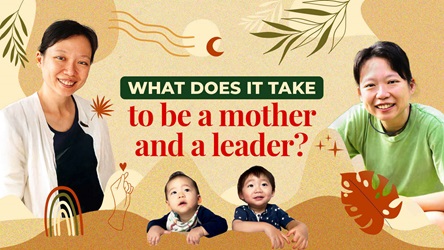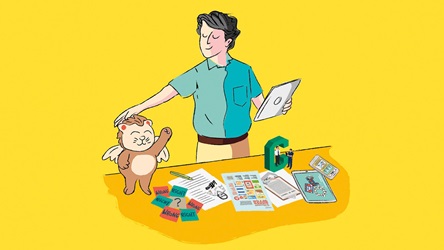Almost Everybody In Singapore Is Our Customer

The lobby of the ICA Building, home to the Immigration & Checkpoints Authority (ICA), is buzzing with people collecting their passports.
Some don’t even go to the counter. They just use a self-service kiosk that spits out the new red book in under three minutes, after its robotic system verifies the person’s identity through facial and fingerprint recognition.The once snaking queues and packed rooms are memories from a decade ago.
Mr Clarence Yeo, who started out as an immigration officer in November 1990, is the man driving this massive transformation at the ICA ever since he was appointed Commissioner in September 2010.
It is no mean task. The ICA takes care of a diverse portfolio including registration functions such as the issuance of Singapore identity documents, processing of citizenship and permanent residence application, visas and granting foreigners various immigration facilities. It also safeguards Singapore’s borders at all the land, air and sea checkpoints.
“We have touch points from cradle to grave. Almost everybody in Singapore is our customer,” Mr Yeo notes.
Inspiring innovation
In the last six years, the ICA has used technology to push through dramatic changes in its service delivery, such as the automated passport-collection kiosks. Over 97% of passport applicants now submit their applications through non-counter modes, clear proof of the ICA’s success in getting customers to adopt its innovations.
This was achieved through “reframing the ICA’s value proposition to its customers”, Mr Yeo says. For example, the ICA introduced a $10 rebate for non-counter passport applications to incentivise those who are tech-savvy to use the online option. For those who are willing but unable to do so, e.g., the elderly, they can approach friends or family as well as photo studios and Singapore Post to help them make an assisted online application.
Reframing the way customers view their relationship with the ICA will continue to be a focus for the organisation. “We want to make our customers part of the service delivery journey, and co-create the service experience,” Mr Yeo says.
“In the future, there will be a lot more ‘self-service’ opportunities for our customers.”

This approach also extends to the checkpoints. Automated clearance – where the presence of an officer is not required in the checking of passports – is now open to more categories of travellers and modes of travel. For example, there are now automated clearance lanes at the land checkpoints for people travelling on buses, motorcycles and lorries.
The ICA is now trialling automated clearance for cars. “We need technology that can pinpoint the number of car passengers before we can do automated clearance,” Mr Yeo explains. “The car may have a single driver, or it may be a space wagon with seven people in it – and here we’re only talking about people who are not hiding inside the car.”
Even as the ICA cares about improving its service delivery, security remains its top priority. Mr Yeo believes both can be achieved: “Our officers adopt a ‘security-focused, service-conscious approach’,” he says. “Our bread and butter is security, it’s something we won’t compromise.”
Galvanising staff
Mr Yeo believes that ordinary people can achieve extraordinary results if “aligned to a common objective”, which in the ICA’s case, is to continue to drive forward its transformation to “transform the present so as to secure its future”.
But how does the Commissioner do that with nearly 6,000 officers spread across the island at various ports of entry and offices?
First, he says, one needs to “walk the talk”, so that officers can “trust that you mean what you say”.
“I want my officers to be proud of the organisation and the uniform,” he adds, explaining why he had chosen to have Challenge interview him at his office, where he is in uniform.
The organisation has a set of powerful and easy-to-remember vision, values and expectations, which Mr Yeo trots out throughout the interview. Its vision, “Inspiring Confidence in All”, and its values (“I” for integrity, “C” for commitment and “A” for accountability) repeat the abbreviation of its name. And all its officers need to remember, on top, is “ABC”: “A can-do mentality, a Be-better attitude, and a Collaborative spirit”.
This collaborative spirit, which is built on trust, is a result of investing time to build quality relationships, he says. This goes for both the ICA’s customers and its partner agencies or international counterparts. “If you have good quality relationships, you have good quality thinking, actions and ultimately, results. In school, you always work better on projects if you like the people you work with.”

With people as its most important asset, the ICA invests heavily in training for its officers. To overcome the challenge of engaging officers who are spread out across the island and work over different shifts, the ICA’s training and learning framework uses creative ways, including experiential learning, e-learning and even game-based learning, to train them.
“The holistic and robust learning experience motivates my officers to continuously learn and be better at what they do so as to keep our borders safe and secure.”
An ICA veteran
Being in a position of influence is one that Mr Yeo, who comes from a humble background, fully appreciates. He is the ICA’s first “home-grown” leader. Previous ICA Commissioners were from other Home Team agencies.
“My officers were happier for me than I was,” he says. “It shows that the service is able to come up with the number one person in the organisation, and that ICA officers can aspire to become Commissioner one day.”
“My leadership principle of never giving up is a reflection of my personal experience. More importantly, it taught me the value of making a difference in other people’s lives,” he says.
When asked what he does to de-stress, he answers, deadpan: “I look at the funny side of things. Sometimes my staff can’t differentiate whether I’m joking or serious.” You do wonder if he is joking when he says one of his favourite things in life is to go travelling, with his wife and 25-year-old daughter, to interesting places that might be “destroyed” by man one day.
He isn’t. The Commissioner just doesn’t take security for granted. “In July 2001, we were in the US and took many photos of the Twin Towers. In September, they were no longer there.”
Final question: When he travels, does he go through the checks?
“Of course, I go through normal automated clearance. The officers recognise me, but I tell them, ‘No, no, let me go through and experience the process as a customer.’”

What’s in your daily cuppa?
Kopi on the rocks (not more than twice a day), and occasionally, I reward myself with a cappuccino.
- POSTED ON
Apr 4, 2017
- TEXT BY
Wong Sher Maine
- PHOTOS BY
Norman Ng
- ART DIRECTION BY
Yip Siew Fei
-
Feature
Why DBS Wants To Be Gandalf









